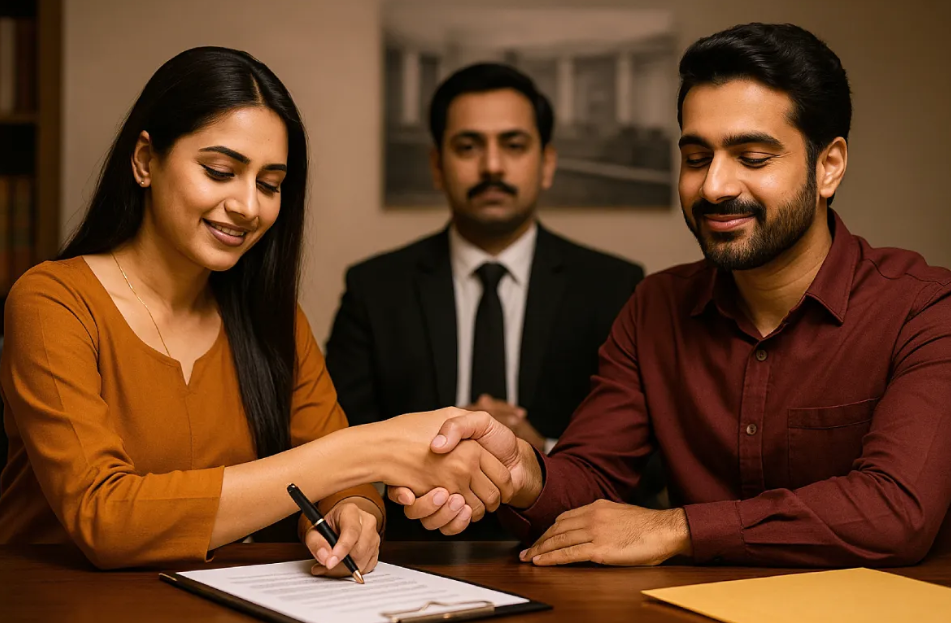Mutual Consent Divorce in India: Complete 2025 Guide
Mutual Consent Divorce in India
The life between husband and wife is considered heavenly which brought together through marriage.
Divorce is never easy, but when both partners are in agreement to go their separate ways amicably, the process can be much easier. Mutual Consent divorce in India serves as an opportunity for those couple who want to conclude their marriage legally, but are on friendly terms with each other to resolve their marital issues over their children or properties if any. If you’re thinking about this, guide will tell you everything you need to know in the year 2025.
What Is Mutual Consent Divorce?
By mutual consent divorce we mean the situation where both husband and wife decide to end their marriage without laying blame on each other. Rather than battling in court over who screwed whom, both partners agree the marriage isn’t working and they’d like to part ways amicably.
Such a divorce is permissible under Section 13B of the Hindu Marriage Act, 1955, with similar provisions for dissolution in other personal laws such as Special Marriage Act, 1954 etc. The concept is basic: If you both want out, the law won’t force you to remain married.
Why Choose Mutual Consent Divorce?
Faster Process
Ordinary divorce cases in India can take forever — that is, sometimes 3 to 5 years, or more. They changed how long it can take to get a divorce, and with mutual consent divorce you can be legally separated in just 6 months (though things are even faster now).
Less Expensive
When you’re fighting a contested divorce, that involves hiring lawyers for numerous court hearings, and it’s not cheap. There are lesser number of visits to court and less paper work which can help you save thousands of rupees.
Privacy Protected
Even in contested divorces, each spouse typically does not lay bare the intimate details of his or her marriage in open court. Mutual consent means no dirty laundry. It is a more simple and dignified process.
Lower Emotional Stress
Court cases breed anger and resentment. Because when you both decide to separate, there’s going to be less fighting and less drama and you’ll be able to get on with your life more civilly.
Essential Conditions for MCD in 2025
Before you file for mutual consent divorce, you must have:
| Requirement | Details |
|---|---|
| Length of Marriage | You’ve been married for at least 1 year |
| Separated | You and your spouse have lived apart for 1 year (or more) |
| No Reconciliation | Both you and your spouse agree there’s no chance to make up |
| Mutual Agreement | Both the husband and wife genuinely want the divorce |
| Settlement Terms | Decisions about kids, stuff, and money must be settled |
Important Note on One-Year Rule
Here is what the law says: You have to be married at least a year before filing for divorce. This waiting period is meant to provide partners an opportunity to reflect and perhaps turn things around.
The Step-by-Step Process
Step 1: Prepare Your Agreement
Before stepping into court, sit down at a table (usually with lawyers) and agree on:
Custody: With whom will the children live? What about visitation rights?
Child Support: How much money will come due for the children to be supported?
Spousal Support: Does one spouse need to pay the other money? How much and for how long?
Property Division: What are the assets — house, car, bank accounts, jewelry and the like — that each person will receive?
Write everything down clearly. This is a part of your divorce petition.
Step 2: File the Initial Petition
You, each of you (the “petitioners”) go to the family court in your area and fill out a joint petition. You’ll need:
- Marriage certificate
- Evidence you have separated (such as rental agreements at different addresses)
- Proof of identity (Aadhaar card, PAN card)
- Recent photographs
- Address proof
- Proof of income (if someone is paying alimony)
The court will give you a date for the ‘first hearing’, this is typically about 2-4 weeks after you submit the forms.
For expert legal assistance with your divorce proceedings, visit Zista Legalis.
Step 3: First Court Appearance
At the hearing, you and your spouse (who filed the Petition) both stand in front of a judge. You will be questioned to ensure:
- You both really want to be divorced
- Nobody is being coerced or bullied
- You know what you are getting into
Your words will be placed in a transcript by the judge. If everything looks good, the judge will set up the next hearing.
Step 4: The Waiting Period
Following the initial hearing, there’s typically a 6-month waiting period. This “cooling off” period provides a chance for couples to take back their decision. During these 6 months:
- You don’t need to go to court
- If you want to remain married, you are allowed to change your mind
- You are not able to marry anyone else (you are still married in the eyes of the law)
2025 Update: Most courts have eliminated this 6-month waiting period if requested by both parties and the judge believes that reconciliation is impossible. In just 2-3 months some couples are already getting a divorce now!
Step 5: File Your Second Motion
After that waiting period is up (or before if you can get the two of you to agree on it), each of you then file a second petition stating that, despite everything you just said in your first set of papers, both of you still want the divorce. You have to file this within 18 months of your initial petition — if you wait too long, all the papers have to be redrafted from scratch.
Step 6: Final Hearing and Decree of Legal Separation
Both of you, come back to court. The judge inquires as to whether you have reconsidered. If you both still want to get divorced, the judge:
- Reviews your settlement agreement
- Makes sure it’s fair for both sides
- Passes the final divorce decree
You are legally divorced and free to marry as soon as you get the decree.
How Long Does It Really Take?
| Timeline Step | Duration |
|---|---|
| Filing to first court appearance | 2-4 weeks |
| Cooling off period | 6 months (unless waived) |
| Second filing to final decree | 2-4 weeks |
| Total Time | |
| Traditional process | 7-8 months |
| Fast track process | 1 month |
The actual time depends on:
- How busy your local court is
- If you apply to waive the waiting period
- If all your paperwork is right
- If you both arrive on time
Costs Involved
Fees for mutual consent divorce could be different but normally may include:
Court Fees
Lawyer Fees
Settlement Costs
Nothing but what you consent to is involved in these:
- Alimony (one-time or monthly)
- Property transfer costs
- Child support arrangements
Child Custody and Support
The court’s paramount concern is if you have children.
Custody Options
Physical Custody: Where child lives day-to-day
Legal Custody: Who makes critical decisions (school, health, religion)
Joint Custody: Both parents share responsibilities
Visitation Rights: Schedule for non-custodial parent to see kids
What Courts Consider
- The age of the child (younger tend to live with mom)
- Each parent’s financial situation
- Who has provided primary caregiving
- The child’s preference (in the event that they are old enough to indicate a preference; typically 9+)
- Each parent’s character and lifestyle
Child Support
The non-custodial parent usually pays a monthly support for:
- School fees and education expenses
- Medical care
- Food, clothing, and basic needs
- Extracurricular activities
The figure is determined according to the income of the paying parent and the needs of the child. Normal child support would be between ₹5,000 and ₹50,000 a month — more if the parent is high income.
Alimony and Financial Settlement
Types of Alimony
Permanent Alimony: Monthly payments that last a lifetime or until the recipient remarries
Rehabilitation Alimony: Temporary support while the spouse gets on their feet
Lump Sum Alimony: One time lump sum payment to settle everything
Factors That Determine Alimony
- Length of the marriage
- Earnings and ability to earn of the parties
- Standard of living during marriage
- Age and health of both parties
- If one spouse was career focused, and the other a stay-at-home parent
- Home contributions (even non-monetary)
Note: In mutual consent divorce, you need to decide the terms together. Actually, the court only determines whether it is fair and reasonable.
Property Division
Unlike some Western countries, Indian law does not have automatic 50-50 property division rules. Instead:
- Property owned pre-marriage tends to go to the party who originally owned it
- There is a presumption of division of property acquired during the marriage
- Gifts and bequests would usually go to the recipient
- Sale of jointly owned property and division of proceeds
What You Need to Decide
- Who gets the house (or does it go on the market?)
- Splitting bank accounts and investments
- What happens to vehicles
- How to divide up jewelry and personal property
- Partition of business property (where appropriate)
Whatever you are doing, get it all down on paper and include that in your court petition. If the divorce decree is entered under a settlement reached by you, you cannot later plead cheated.
For comprehensive guidance on property matters in divorce, you can refer to resources from the Ministry of Law and Justice, Government of India.
Common Mistakes to Avoid
Mistake 1: Hiding Assets
People sometimes conceal bank accounts or property in hopes that they will not have to share them. This is illegal and can be an invalidation of your settlement should the same be found out. Be honest about what you own.
Mistake 2: Vague Agreements
Do not say “suitable alimony shall be paid,” or “child custody to be decided in the future.” Be specific: precise figures, dates and terms. Bad ideas also tend to spawn future court battles when the agreements are vague.
Mistake 3: Skipping Legal Advice
Although a mutual consent divorce is less complicated, it’s important to have an attorney review your agreement and protect your rights. Maybe you don’t even know that you are entitled to it, or maybe you’re signing up for terms that are unfair.
Mistake 4: Rushing Without Thinking
It’s mutual, but stop and think. Once the decree of divorce is issued, it’s extremely hard to reverse. Make sure you’re truly ready.
Mistake 5: Violating Terms Later
If you agree to be ordered to pay alimony or child support, you will be obligated to do so. Failure to pay can lead you back to court where the judge may find you in contempt of a court order, which could mean fines or jail time.
What If One Person Gets Cold Feet?
A person may withdraw from the divorce during the 6 months. If either of them isn’t there for the second motion, the divorce does not go through. You can’t force your partner to divorce you.
If your spouse has second thoughts, you have two options:
- Tell them they should keep on going
- File for a fault divorce on the grounds of cruelty or desertion (this process takes way longer)
Can You Remarry After a Mutual Consent Divorce?
Yes! When you get the divorce decree is when you are legally able to remarry. However:
- Preserve a certified copy of your divorce decree
- In some cases you have to wait up to 90 days (consult your local law)
- Your new spouse will need the divorce decree for proof
Recent Changes in 2025
Faster Processing
Several judges of High courts have directed family court judges for the waiving off 6 months waiting period when both parties consented and there were good circumstances.
Online Filing
A few states have moved to permit electronic filing of divorce petitions, making the initial step more convenient. Look up your local Family Court’s website.
Mediation Services
Courts are requiring or offering more and more mediation time to help couples come to fair agreements, especially where children and finances are involved.
E-Courts Integration
Electronic case management – online tracking of your case, SMS/email hearing dates and electronic orders.
Frequently Asked Questions
Can we divorce without ever having to appear in court?
Yes. You can grant the Special Power of Attorney to someone who knows the facts, and the court may insist that the parties appear through the Video conference procedures, same will be varied in the courts
What if we were married outside India?
If your marriage has been registered abroad but both you are now living in India, you can file for mutual consent divorce in Indian court. You must submit a certified foreign marriage certificate.
Do we need separate lawyers?
It’s not required, but it’s strongly advised. Even in a no fault divorce (where both parties agree), your interests may not be the same (especially when it comes to money and property). Each having its own lawyer will ensure you both get fair advice.
Can we cancel the divorce?
Yes, before a final decree is issued. Should you both wish to reunite, all you must do is notify the court and your file will be closed. This is a risk-free option.
What if my partner is in a different town or country?
The divorce petition can be filed in the last place where you lived together or where you got married. If your spouse is overseas, they may grant someone in India the power of attorney to act on his or her behalf before a court, taking up personal appearances where it is necessary.
Will my employer or family know that I am getting a divorce?
Court records are public, but in reality divorce cases do not garner attention unless someone is looking for them. It is unlikely most of your potential employers will know unless you tell them. Your privacy is generally maintained.
After the divorce, can I alter the settlement terms?
Not easily. The agreement that justifies the settlement is incorporated in the order of court. To open or modify down the road, you’d submit a new petition that demonstrates “substantial change in circumstances” (like lost employment or a serious illness).
What if we can’t agree on everything?
If you’re just hung up on one issue, or two, consider mediation. In many courthouses, there are free mediation centers. If you seriously can’t agree on big issues, you couldn’t do mutual consent divorce — you’d need to file a contested divorce.
Is mutual consent divorce same for all religions?
Yes, though the law depends on your religion:
- Hindus, Buddhists, Jains, Sikhs: Hindu Marriage Act (1955)
- Muslims: Muslim law (khula/talaq by consent)
- Christians: The Indian Divorce Act, 1869 (as amended)
- Marriages between inter-religious couples: Special Marriage Act, 1954
The fundamental principle of mutual consent is common to all the personal laws.
Can I get divorced while pregnant?
Yes you can get mutual consent divorce when a woman is pregnant. But you will need to make provisions for child support and custody of the unborn child in your agreement.
Final Thoughts
Mutual consent divorce is a mature and respectful way to end an unworkable marriage. It recognizes that, sometimes, relationships just don’t work out and both parties should be able to move on with grace.
The secret to a peaceful mutual consent divorce is open communication, fair give and take and accurate documentation. Use caution in considering and accepting the settlement — don’t settle just to get it over with. Ensure your agreement covers yourself and/or if you have children, ensure that it is in the child’s best interest.
And lest we forget, there’s nothing wrong with divorce; it is not a failure but a beginning. With the proper mindset, you can find closure with this chapter of your life calmly and begin anew with potential, excitement and optimism for the future.
If you are thinking about mutual consent divorce, speak with an experienced family law lawyer in your jurisdiction. They can help you better understand the law in your state and make certain that your rights are preserved every step of the way.
Your journey with your spouse may be over, but yours is not. Be sure to end this chapter in the most positive way.
For expert legal consultation and assistance with mutual consent divorce, visit Zista Legalis today.





